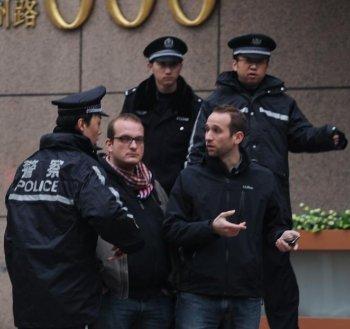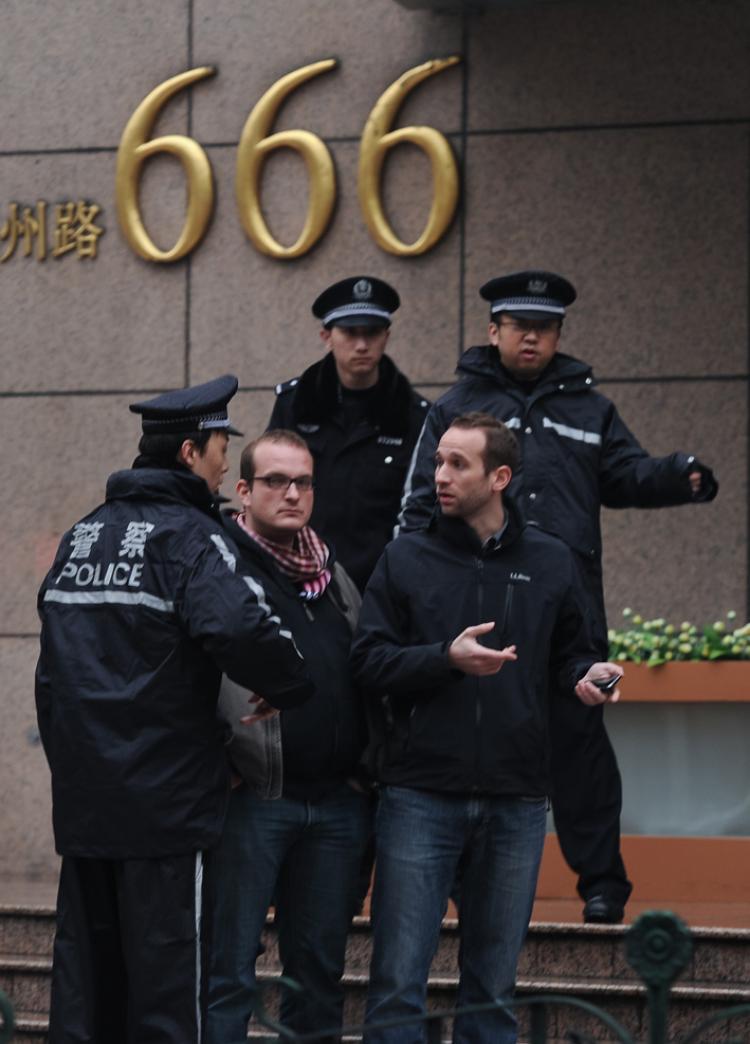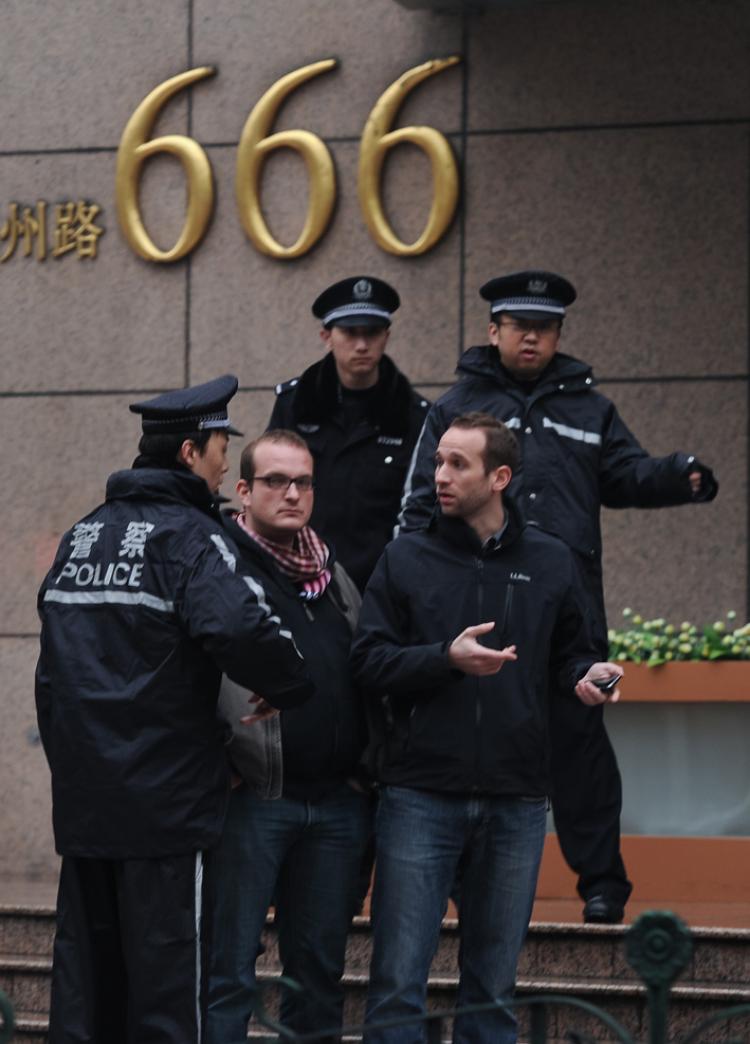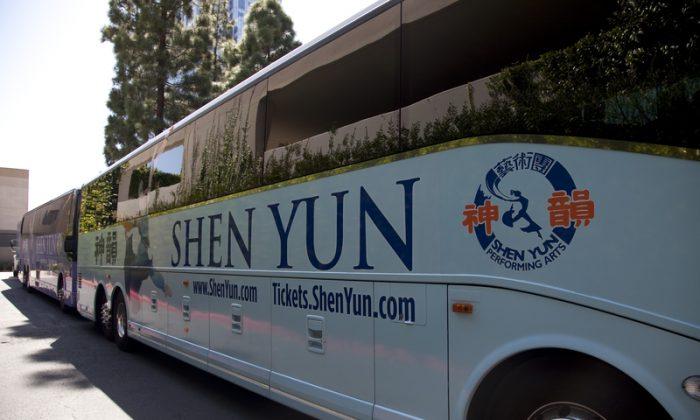The equivalent of China’s legislature convened for its annual session on March 3, while security forces continued to round up dissidents and intimidate Western journalists.
The meeting of the National People’s Congress, along with the Chinese People’s Political Consultative Conference, are known as the “two sessions.” They began on the same weekend that renewed calls went out for Jasmine Revolution style protests in cities across China.
Reflecting the regime’s worries about such activities getting out of hand, security around Beijing was heightened, and during the sessions announcements were made to boost both the military payroll and spending on domestic security forces.
In Beijing, security forces have been increased, with over 700,000 officers enlisted, according to officials. Beijing resident Ms. Li told The Epoch Times that patrols and guards can be seen everywhere, and police are on guard with submachine guns on East Chang An Avenue, near the action.
Mr. He, another resident said the atmosphere in Beijing is especially tense this year due to the talk of a “Jasmine Revolution.” He said the police check people for just taking a few looks at something, and even foreign reporters are subject to violence from security forces.
Beijing is also using hi-tech means to monitor citizens’ whereabouts via cell phones, according to official media.
Several universities in Beijing, Jiangsu, and Shanxi Provinces have received instructions to forbid faculties and students from leaving the campus, according to some Internet posts.
The Chongqing Kechuang Vocational College in Sichuan Province was locked down after police arrested two students for spreading information about the Jasmine Revolution online, Deutsche Welle reported on Feb. 28. Radio Free Asia reported that Xi'an Shiyou University has also been locked down once.
Authorities have arrested many human rights and democracy activists and charged eight people with subversion of state power.
CCP officials are telling people they will be making life better for them.
Jia Qinglin, chairman of the People’s Political Consultative Conference said during the opening on March 3, the regime will improve people’s livelihood, and government officials are encouraged to reach out to people.
While delivering a government work report in the National People’s Congress on March 5, Chinese premier Wen Jiabao proposed a reduced annual GDP growth rate of 7 percent. Wen said curbing inflation and increasing the income for low-income people will be the regime’s two primary goals.
Wen admitted that top public concerns such as inflation, high housing and consumer goods prices, rampant corruption, and illegal land seizures have not been resolved fundamentally. He also acknowledged that corruption and the widening wealth gap have triggered great social discontent.
Nevertheless, military expansion and internal stability maintenance are still among the regime’s top priorities.
Wen said China will continue to build a strong military system, and military spending will increase by 12.7 percent in 2011, amounting to US$91.5 billion.
The spending increase will include pay raises for soldiers and officers of up to 40 percent, effectively buying the loyalty of the rank-and-file.
The Finance Ministry released a report on March 6, stating that the budget for internal security spending is 624.4 billion yuan (US$95 billion), up 21.5 percent from last year. This is the first time domestic security spending has surpassed military spending.
This reflects Beijing’s belief that the threat from internal discontent is far greater than from external factors. This reflects China’s internal dynamics where mass protests, some of them openly antigovernment, occur regularly, according to Radio France Internationale on March 5, who spoke to current affair commentator Cheng Xiang.
Cheng suggested that the regime would be better off putting that money into social services.
“People’s livelihood obviously is not the regime’s top priority,” Chen Pokong, an economic and political commentator told New Tang Dynasty (NTD) TV in a recent program.
“Considering that military spending accounts for 6 percent of the country’s total spending, topping any other category except domestic security, and considering the double digit annual increase in military spending for the past 20 years ... in order to stay in power, the Chinese regime will continue to spend big on strengthening its military despite growing social discontent,” Chen said.
“To give China’s 2.5 million soldiers pay raises, the regime has to print more money, which will further accelerate inflation,” professor Showing Young of the Department of Business Management, National Sun Yat-Sen University in Taiwan told The Epoch Times. Young added that out-of-control inflation will inevitably lead to social upheaval.
“The land mines for social upheaval have been planted in today’s Chinese society, and when they eventually explode, one after another, it will be more intense and horrifying than the recent Jasmine Revolution,” Young said.
Representatives at China’s rubber-stamp congress sessions are not allowed to speak. Only paramount leaders and chairmen of the two meetings have that privilege.
“Representatives can only speak at small meetings. This is a rule set by Mao Zedong to prevent anyone from delivering discordant messages in the two meetings,” political commentator Chen Pokong said during the NTD program.
“Therefore, what the members talk about in the two meetings really has no significance at all,” Chen said.
“Nothing substantial has ever come out of the two meetings in the past, and [so far] this year is no exception,” Li Tianxiao, another commentator for NTD said.
[email protected]
The meeting of the National People’s Congress, along with the Chinese People’s Political Consultative Conference, are known as the “two sessions.” They began on the same weekend that renewed calls went out for Jasmine Revolution style protests in cities across China.
Reflecting the regime’s worries about such activities getting out of hand, security around Beijing was heightened, and during the sessions announcements were made to boost both the military payroll and spending on domestic security forces.
Heightened Security
In Beijing, security forces have been increased, with over 700,000 officers enlisted, according to officials. Beijing resident Ms. Li told The Epoch Times that patrols and guards can be seen everywhere, and police are on guard with submachine guns on East Chang An Avenue, near the action.
Mr. He, another resident said the atmosphere in Beijing is especially tense this year due to the talk of a “Jasmine Revolution.” He said the police check people for just taking a few looks at something, and even foreign reporters are subject to violence from security forces.
Beijing is also using hi-tech means to monitor citizens’ whereabouts via cell phones, according to official media.
Several universities in Beijing, Jiangsu, and Shanxi Provinces have received instructions to forbid faculties and students from leaving the campus, according to some Internet posts.
The Chongqing Kechuang Vocational College in Sichuan Province was locked down after police arrested two students for spreading information about the Jasmine Revolution online, Deutsche Welle reported on Feb. 28. Radio Free Asia reported that Xi'an Shiyou University has also been locked down once.
Authorities have arrested many human rights and democracy activists and charged eight people with subversion of state power.
Corruption and Wealth Gap
CCP officials are telling people they will be making life better for them.
Jia Qinglin, chairman of the People’s Political Consultative Conference said during the opening on March 3, the regime will improve people’s livelihood, and government officials are encouraged to reach out to people.
While delivering a government work report in the National People’s Congress on March 5, Chinese premier Wen Jiabao proposed a reduced annual GDP growth rate of 7 percent. Wen said curbing inflation and increasing the income for low-income people will be the regime’s two primary goals.
Wen admitted that top public concerns such as inflation, high housing and consumer goods prices, rampant corruption, and illegal land seizures have not been resolved fundamentally. He also acknowledged that corruption and the widening wealth gap have triggered great social discontent.
Security Spending Up
Nevertheless, military expansion and internal stability maintenance are still among the regime’s top priorities.
Wen said China will continue to build a strong military system, and military spending will increase by 12.7 percent in 2011, amounting to US$91.5 billion.
The spending increase will include pay raises for soldiers and officers of up to 40 percent, effectively buying the loyalty of the rank-and-file.
The Finance Ministry released a report on March 6, stating that the budget for internal security spending is 624.4 billion yuan (US$95 billion), up 21.5 percent from last year. This is the first time domestic security spending has surpassed military spending.
This reflects Beijing’s belief that the threat from internal discontent is far greater than from external factors. This reflects China’s internal dynamics where mass protests, some of them openly antigovernment, occur regularly, according to Radio France Internationale on March 5, who spoke to current affair commentator Cheng Xiang.
Cheng suggested that the regime would be better off putting that money into social services.
“People’s livelihood obviously is not the regime’s top priority,” Chen Pokong, an economic and political commentator told New Tang Dynasty (NTD) TV in a recent program.
“Considering that military spending accounts for 6 percent of the country’s total spending, topping any other category except domestic security, and considering the double digit annual increase in military spending for the past 20 years ... in order to stay in power, the Chinese regime will continue to spend big on strengthening its military despite growing social discontent,” Chen said.
“To give China’s 2.5 million soldiers pay raises, the regime has to print more money, which will further accelerate inflation,” professor Showing Young of the Department of Business Management, National Sun Yat-Sen University in Taiwan told The Epoch Times. Young added that out-of-control inflation will inevitably lead to social upheaval.
“The land mines for social upheaval have been planted in today’s Chinese society, and when they eventually explode, one after another, it will be more intense and horrifying than the recent Jasmine Revolution,” Young said.
One Voice
Representatives at China’s rubber-stamp congress sessions are not allowed to speak. Only paramount leaders and chairmen of the two meetings have that privilege.
“Representatives can only speak at small meetings. This is a rule set by Mao Zedong to prevent anyone from delivering discordant messages in the two meetings,” political commentator Chen Pokong said during the NTD program.
“Therefore, what the members talk about in the two meetings really has no significance at all,” Chen said.
“Nothing substantial has ever come out of the two meetings in the past, and [so far] this year is no exception,” Li Tianxiao, another commentator for NTD said.
[email protected]




